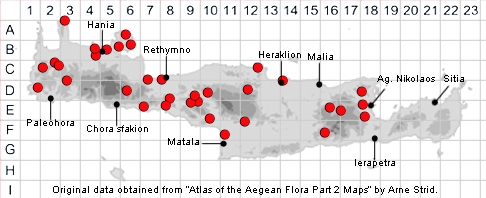RANUNCULUS MARGINATUS
Family and Genus:- See- RANUNCULACEAE/Subgen. RANUNCULUS/Sect.
Common Names:- None
Homotypic Synonyms:- Ranunculus parvulus, Ranunculus sardous,
Ranunculus trachycarpus.
Meaning:- Ranunculus (L) Little-frog, diminutive of rana, (reference to the water-
loving habit of many species).
Marginatus (L) Having a distinct margin.
General description:- More or less softly hairy (pubescent) annual.
Stems:-
1) 10-45 cm.
Leaves:-
1) Basal, cordate, dentate;
a) middle lobe, larger and often itself trilobed.
b) petioles, broadly winged at the base.
2) Upper, unlobed or with three simple untoothed divisions.
Flowers:-
1) 12-25 mm Ć.
2) Sepals, deflexed.
3) Honey-leaves, 3-4 mm, 2-3 times as long as sepals, deep yellow.
4) Pedicel sulcate.
5) Receptacle pubescent.
Fruit:-
1) Achenes, 2·5-3 mm, smooth or minutely punctate, with small, obtuse tubercles
near the margin, or sometimes a smooth; beak c. 1 mm, lanceolate and
2-veined.
Key features:-
1) Achene, ± strongly compressed; distinctly spiny or muricate with numerous long
projections.
2) Honey-leaves, 2-3 times as long as sepals, deep yellow.
4) Pedicel, sulcate.
5) Sepals, deflexed.
6) Receptacle, pubescent.
Habitat:- Seasonally flooded meadows, fallow fields, ditches. 0-800(-1500) m.
Distribution:- Throughout Greece, common and often gregarious in S & C
mainland. - W, C & C Europe, mainly absent from the Iberian Peninsula; NW
Africa, Anatolia, Cyprus. Scattered across Crete, absent from the central and
eastern regions.
Flowering time:- Mostly late Mar to mid-May.
Photos by:- Steve Lenton
SPECIES DESCRIPTION

